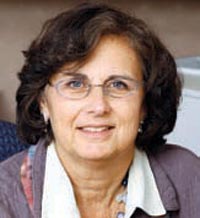
Dale Sandler, Principal Investigator, The Sister Study Chief, Epidemiology Branch The National Institute of Environmental Health Sciences (NIEHS)
Photo courtesy of NIH/NIEHS
By Dale Sandler, Ph.D.
For thousands of women whose sisters have or have had breast cancer, the Sister Study is helping uncover clues that may ultimately eliminate this dreaded disease.
We all know that breast cancer does not discriminate. Whether a woman is in her 30s or over 65, Asian American or African American, executive or laborer, this disease is a major health concern for women everywhere. When diagnosed most women ask, "Why and how did I get this disease? Is it something I did or was exposed to?"
Unfortunately, as of today, there is no clear answer. Wouldn't you like to know if breast cancer is caused by something women come in contact with at work, at home or in their communities? That's what the Sister Study is trying to answer.
The Sister Study is a nationwide research study of sisters of women who have had breast cancer, being conducted by the NIH's National Institute of Environmental Health Sciences (NIEHS). The purpose of the Sister Study is to learn how the environment and genes may interact to affect the chances of getting breast cancer. This long-term observational study is specifically looking at variations in genes that affect the biologic response to exposures to certain chemicals, foods and hormones. Sisters of women with breast cancer have a specialinterest in participating because they have about twice the risk of developing breast cancer themselves, compared with the general population.
We've enrolled more than 27,000 participants, but need thousands more. With a goal of enrolling 50,000 women by September 2007, our team of researchers cannot find the causes of breast cancer without the participation of a diverse cohort of women. We are committed to enrolling women from all backgrounds, occupations, races, ethnicities and regions.
Dr. Anna Nápoles-Springer, assistant adjunct professor at the University of California, San Francisco, learned about the Sister Study at a meeting for Redes En Acción, an organization battling cancer among Latinos. "I was greatly encouraged to learn of the tremendous efforts being made by the Sister Study, nationally and at the grassroots level, to enroll ethnic minority women, since historically we have not been well represented in research," says Dr. Nápoles-Springer. "Only by participating can we be confident that the results will apply to women such as ourselves, so that our communities can benefit."
Women ages 35 to 74 may be eligible to join the Sister Study if (1) their sister (living or deceased), related to them by blood, had breast cancer; (2) if they themselves have never had breast cancer; and (3) if they live in the United States or Puerto Rico.
The Sister Study has made participation as convenient as possible. At the beginning, participants answer telephone and written surveys and provide blood, urine, household dust and toenail samples. The study is the first of its kind to collect such extensive and detailed information about environmental exposures. After that, our researchers contact participants once a year, for 10 years or more, to learn about changes in their health, lifestyle or environment. Participants are not required to take any medications, undergo any treatments, or make any changes in their daily lives.
Want to Volunteer for the Sister Study?
To volunteer or learn more about the Sister Study, visit the Web site www.sisterstudy.org; for Spanish, visit www.estudiodehermanas.org. A toll free number is also available: 1-877-4SISTER (877-474-7837). Deaf or hearing-impaired women may call 1-866-TTY-4SIS.
We are inviting women and physicians to help us spread the word to those affected by breast cancer. The study's researchers and participants want to find the causes of breast cancer so that future generations, including the daughters, granddaughters and nieces of women, don't have to experience the disease.
The Sister Study has free, multiethnic brochures available for distribution, and is available in English and Spanish.
